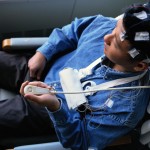

June 27, 2016, is National PTSD Awareness Day, so we have put together some of our news stories that discuss PTSD and surrounding factors, including stories on rheumatoid arthritis risk and PTSD, heart attack and PTSD, as well as stroke and cancer.
PTSD – post-traumatic stress disorder – is commonly seen in war veterans, but it can affect anyone who has undergone a traumatic experience. It can be a disability for those living with the condition and can make daily life quite challenging. Aside from PTSD being a mental disorder, it can affect overall health as well, and that is why we have put together our news stories regarding PTSD to keep you aware of the challenges these patients face.
 Rheumatoid arthritis risk in women with post-traumatic stress disorder (PTSD) higher: Study
Rheumatoid arthritis risk in women with post-traumatic stress disorder (PTSD) higher: StudyRheumatoid arthritis (RA) risk is higher among women with post-traumatic stress disorder (PTSD), according to research. PTSD is a condition resulting from a stressful or traumatic experience and is characterized by intrusive memories of the event, increased arousal, avoidance of experiences associated with the traumatic event, and loss of interest in activities and relationships.
To uncover the association between PTSD and rheumatoid arthritis and the role of smoking, researchers looked at 49,693 women enrolled in the Nurses’ Health Study II. Participants completed questionnaires about lifestyle, health practices, and other conditions at baseline and then every two years throughout the course of the study.
Study participants completed the Brief Trauma Questionnaire and a PTSD screener to identify whether and when trauma and PTSD symptoms may have occurred. Participants did not have rheumatoid arthritis or lupus.
Smoking prevalence was higher among women with PTSD symptoms. The more symptoms a woman experienced the more she smoked.
The results of the study also showed the correlation between the experienced symptoms of PTSD and the risk for rheumatoid arthritis. When smoking was factored in, the risk of rheumatoid arthritis in PTSD was even greater.
The authors concluded, “Further studies are necessary to examine the role of other behaviors and clinical characteristics, such as alcohol consumption and obesity, as potential confounders and/or mediators of the association between PTSD and risk for rheumatoid arthritis. In addition, assessments of serum and salivary cortisol levels, to characterize basal HPA axis activity and the stress response, are needed to investigate biologic pathways linking PTSD with an increased risk for RA.” Continue reading…
 PTSD may increase heart attack and stroke risk in women
PTSD may increase heart attack and stroke risk in womenPost-traumatic stress disorder, or PTSD, an anxiety disorder, is often associated with those who have gone to war. PTSD happens in people who have experienced traumatic events and continue to recall stressors.
Symptoms of PTSD can come in the form of nightmares, flashbacks, difficulty sleeping, and feelings of detachment. Since PTSD is most commonly associated with soldiers returning from war, it’s often overlooked that women experience PTSD twice as much as men.
Although men and women experience many similar symptoms of PTSD, there are some important differences as well. These differences are mainly due to the difference in causes.
Women are more likely to be jumpy, have difficulty expressing emotions, and avoid situations or scenarios that may remind them of their traumatic experience. Men, on the other hand, are often angry and have great difficulty controlling their anger. Women are more likely to experience depression, while men are more likely to abuse alcohol or drugs.
One thing both men and women with PTSD have in common is that they both experience negative health outcomes. Continue reading…
 PTSD not linked with increased cancer risk
PTSD not linked with increased cancer riskResearchers from Boston University School of Medicine completed the largest study to date to determine the risk of cancer among those with post-traumatic stress disorder (PTSD) and concluded having PTSD does not increase cancer risk.
PTSD United reports that at any given time 24 million Americans have PTSD. PTSD is a condition brought on by severe trauma. It’s reported that nearly 70 percent of the U.S. population experiences trauma and around 20 percent of those individuals will go on to develop PTSD. PTSD is often associated with soldiers and individuals who go off to war, but women are twice as likely to develop PTSD in comparison to men.
Previous research has also confirmed no link between stressful events and cancer risk. Although many theories make a strong case that extra stress can increase cancer risk, results have shown mixed outcomes.
By comparing diagnoses of cancer among individuals with PTSD and the rate of cancer among the general population, the researchers did not find a link.
Corresponding author Jaimie L. Gradus said, “The general public may have a perception that stress contributes to cancer occurrence and given the ubiquity of PTSD and cancer and their costs to individuals and society, any observed associations could have meaningful public health implications.”
The size of the study and the time period allowed researchers to examine factors not previously looked at, which further solidified their findings. Continue reading…
 Defective gene helps predict severity of post-traumatic stress disorder
Defective gene helps predict severity of post-traumatic stress disorderA new study is opening up avenues to detect more symptoms of post-traumatic stress disorder (PTSD) in patients. It is a pioneering study in understanding the role of the spindle and kinetochore-associated complex subunit 2 (SKA2) gene in the development of PTSD.
The details of the study, which was orchestrated by researchers at Boston University School of Medicine (BUSM), the National Center for PTSD, and the Translational Research Center for TBI and Stress Disorders at VA Boston Healthcare System, appear in the online version of the journal Molecular Psychiatry.
PTSD is common among war veterans. Among the veterans who served in Operations Enduring Freedom and Iraqi Freedom, 11 to 20 percent have experienced PTSD in a given year. Studies suggest that compared to the general population, there is a heightened risk of suicide and other mental health aberrations in veterans who have sustained war zone trauma, PTSD symptoms, and other post-deployment mental health problems.
As part of the study, the team analyzed MRI brain scans and blood samples from 200 veterans who had recently returned from conflicts in Iraq and Afghanistan. The aim of the study was to determine whether the blood chemical change in the function of the SKA2 gene could be used to predict the thickness of brain cortex and psychological symptoms, especially PTSD and depression. Continue reading…
 PTSD may be eased with wearable electrical patches
PTSD may be eased with wearable electrical patchesPost-traumatic stress disorder (PTSD) may be eased with wearable electrical patches. These patches jolt the brain in patients while they are asleep and can offer relief from the effects of PTSD.
Iraq war veteran and PTSD sufferer Ron Ramirez tested the patches and believes that they are beneficial in treating PTSD. He explained his story, “About a year later, they figured out that I had a brain injury. I had no motivation, I had constant nightmares, and I couldn’t sleep. And I would get very irritated by other people, getting into altercations, sometimes even with other patients. I couldn’t even take my two daughters out on my own without an escort.”
Ramirez was given all the traditional treatment options currently available for PTSD, from cognitive behavioral therapy to medications. Unfortunately, Ramirez did not experience much relief from PTSD treatment based on traditional methods.
The new wearable electrical patch, known as trigeminal nerve stimulation (TNS), is still in the experimental phase, but it is offering hope for PTSD sufferers that they may finally achieve relief.
Senior study author Dr. Andrew Leuchter explained, “TNS is a new approach to PTSD. The challenge is that despite offering the best treatments that we can, most PTSD patients are left, sometimes for decades, with significant residual symptoms, like anxiety, irritability, explosive outbursts, and sleep difficulty, not to mention depression.” Continue reading…
Copyright © www.orthopaedics.win Bone Health All Rights Reserved